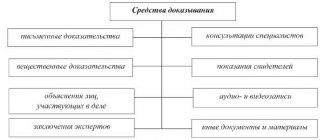Relevance of evidence
The relevance of evidence means:
- its direct or indirect connection with the circumstances that are subject to proof (the main or intermediate fact). Evidence must contain information that is important to the case, i.e., have a connection with the crime event;
- its suitability for establishing a fact included in the subject of proof. At the same time, during the process of proof, the assessment of the relevance of specific evidence may change.
Are you an expert in this subject area? We invite you to become the author of the Directory Working Conditions
Relevant evidence can both establish the main fact and refute the existence of circumstances to be proven. According to this criterion, evidence is divided into
- acquittal (absence of event, corpus delicti, non-involvement);
- accusatory (existence of an event, corpus delicti, involvement and guilt).
Errors in determining the relevance of evidence:
- inclusion in the evidence system of information not related to the subject of proof;
- misinterpretation of relevant evidence when it relates to a fact that is unable to be established.
Admissibility of evidence
Admissibility in criminal proceedings means:
- guarantee of the reliability of the information received;
- compliance of evidence with moral and legal standards;
- a set of legal requirements that evidence must comply with;
- an institution of constitutional and criminal procedural law that ensures fair justice while respecting the rights of the accused.
Functions of the rule on the admissibility of evidence:
Finished works on a similar topic
Course work Admissibility and relevance of evidence in criminal proceedings 450 ₽ Essay Admissibility and relevance of evidence in criminal proceedings 260 ₽ Test work Admissibility and relevance of evidence in criminal proceedings 220 ₽
Receive completed work or specialist advice on your educational project Find out the cost
- protective – the exclusion of inadmissible evidence protects the individual from unlawful actions of the investigative bodies;
- regulatory – prevents possible violation of the procedural form when collecting evidence and conducting investigative actions;
- authentication – guarantees the reliability of the information received.
The components of admissibility are:
- proper source of evidence (for example, the person giving the testimony);
- the appropriate person who received the evidence (for example, the investigator in charge of the case);
- proper form of obtaining evidence (procedural form of investigative or procedural action);
- proper recording of evidence (record of interrogation, not interrogation);
- refusal to use guesses and assumptions in proving.









